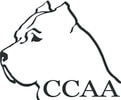We understand when struggling with seizures it can be an emotional time for breeders and owners. Thank you for your willingness to participate in Cane Corso seizure research at the University of Missouri. Working closely with the Cane Corso Epilepsy Project and the University of Missouri, we hope with your willingness to participate there will be a day we understand more about idiopathic epilepsy and seizures.
Cane Corso SEIZURE Sample Submission
Please submit the Submission Form when sending Samples.
Sample Collection Instructions:
Blood Sample - The ideal sample for DNA extraction is 5-10ccs of whole blood, in purple-topped (EDTA) tubes. For very small dogs or puppies, 3ccs should be sufficient. The blood sample needs only to be put in the tubes and rocked gently a few times to distribute the anticoagulant - do not spin, extract serum, or anything further. Refrigerate if the sample is being held for any time before shipping.
Frozen Semen - If there is frozen semen stored from sires or affected dogs, DNA can be extracted from it. Please send 2 straws. They do not need to be shipped frozen, but do pack them in a crush-proof container.
Tissue Sample - Tissue removed because of surgery, or an organ sample upon passing of the dog will provide a large amount of DNA for research. Please discuss this with your vet ahead of time if euthanizing or natural passing of your dog. (If the dog is to be euthanized, have a blood sample pulled first, if possible, and send both samples.) Researcher’s first choice is spleen, second choice kidney, and third choice is liver (a piece approximately the size of a thumb is all that is needed - not the entire organ). One tissue sample is sufficient. The organ must be removed as soon as possible following passing, place organ into a labeled freezer bag, place the initial bag into a second bag, freeze, and ship.
Shipping - Ideally the sample should be shipped immediately (with a tissue sample, make certain it is completely frozen first). If samples are held for a day or over a weekend, blood must be refrigerated and tissue samples must be kept frozen. Ship via OVERNIGHT delivery. (US Mail, UPS or FedEx). Do not send on a Friday - there will not be anyone to accept the delivery on a weekend, and the sample could be unusable by Monday. Pack in a small, insulated container (most vets have these for shipping samples to labs) with one or more cool packs - it is important that blood samples be kept cool but not frozen, and tissue samples be kept as frozen as possible.
SUBMISSION FORM MUST BE INCLUDED: The delivery address is:
Dr. Gary Johnson - (Cane Corso)
DNA Research 320 Connaway Hall
University of Missouri
Columbia, MO 65211
If you need clarification, or have any questions about any of these procedures, please contact Liz Hansen by phone (573-884-3712), email ([email protected]), or regular mail (209A Connaway Hall, University of Missouri, Columbia, MO 65211). Liz is Dr. Johnson’s Coordinator of Veterinary Information. They can help with any questions you may have.
Sample Collection Instructions:
Blood Sample - The ideal sample for DNA extraction is 5-10ccs of whole blood, in purple-topped (EDTA) tubes. For very small dogs or puppies, 3ccs should be sufficient. The blood sample needs only to be put in the tubes and rocked gently a few times to distribute the anticoagulant - do not spin, extract serum, or anything further. Refrigerate if the sample is being held for any time before shipping.
Frozen Semen - If there is frozen semen stored from sires or affected dogs, DNA can be extracted from it. Please send 2 straws. They do not need to be shipped frozen, but do pack them in a crush-proof container.
Tissue Sample - Tissue removed because of surgery, or an organ sample upon passing of the dog will provide a large amount of DNA for research. Please discuss this with your vet ahead of time if euthanizing or natural passing of your dog. (If the dog is to be euthanized, have a blood sample pulled first, if possible, and send both samples.) Researcher’s first choice is spleen, second choice kidney, and third choice is liver (a piece approximately the size of a thumb is all that is needed - not the entire organ). One tissue sample is sufficient. The organ must be removed as soon as possible following passing, place organ into a labeled freezer bag, place the initial bag into a second bag, freeze, and ship.
Shipping - Ideally the sample should be shipped immediately (with a tissue sample, make certain it is completely frozen first). If samples are held for a day or over a weekend, blood must be refrigerated and tissue samples must be kept frozen. Ship via OVERNIGHT delivery. (US Mail, UPS or FedEx). Do not send on a Friday - there will not be anyone to accept the delivery on a weekend, and the sample could be unusable by Monday. Pack in a small, insulated container (most vets have these for shipping samples to labs) with one or more cool packs - it is important that blood samples be kept cool but not frozen, and tissue samples be kept as frozen as possible.
SUBMISSION FORM MUST BE INCLUDED: The delivery address is:
Dr. Gary Johnson - (Cane Corso)
DNA Research 320 Connaway Hall
University of Missouri
Columbia, MO 65211
If you need clarification, or have any questions about any of these procedures, please contact Liz Hansen by phone (573-884-3712), email ([email protected]), or regular mail (209A Connaway Hall, University of Missouri, Columbia, MO 65211). Liz is Dr. Johnson’s Coordinator of Veterinary Information. They can help with any questions you may have.
